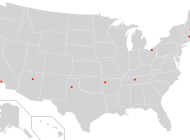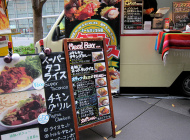
In an update on food truck legislation, more and more towns have been opening up for would be mobile food entrepreneurs. Having seen the positive effect to the community and local economy as well, towns are now amending their archaic food truck laws to accommodate the demand for these street eateries.
6/10 Sartell, MN – Self-contained food vehicles are now allowed to prepare and cook food on-board, opposed to the old rule where only pre-packaged food could be sold. The truck or trailer can now be stationed at a semi-permanent location, but still needs to be moveable at any given time. Parking is allowed in any legal parking space or private property but must be at least 50 feet away from both an existing restaurant and any intersection. Operating time is from 7 a.m. to 11 p.m. Permission would be needed if you wish to operate from city owned property, such as parks.
6/13 Carlisle, PA – Mobile food concessionaires are now allowed to operate not only from private properties but at the borough’s industrial district as well. They are permitted to vend starting 8 a.m. up to to 8 p.m. and are not required to provide seating for customers. For now annual permits would cost $400, the same as those for transient retail vendors.
7/24 Lake Elsinore, CA – Food trucks are now allowed on the city’s construction sites, commercial and manufacturing zones provided that they are in designated parking spaces for large vehicles. Operating from private property is also allowed. Schedule of operations is from 7 a.m. to 10 p.m. and a health permit, mobile vending and business license is needed.
8/6 Spokane, WA – (Update to regulation) Annual fee for a food vending permit was set at $60, plus $10 for every additional location. Permission would also needed from food business establishments if you want to operate within 50 feet of them.
Tags: laws legislation












